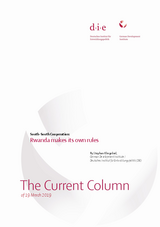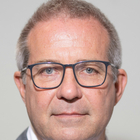Die aktuelle Kolumne
South - South Cooperation:
Rwanda makes its own rules
Klingebiel, StephanDie aktuelle Kolumne (2019)
Bonn: German Development Institute / Deutsches Institut für Entwicklungspolitik (DIE), (The Current Column of 19 March 2019)
Bonn, 19 March 2019. It is difficult to find countries in sub-Saharan Africa where forms of South–South Cooperation (SSC) are not visible. Rwanda is no exception, with the presence of China, in particular, in various parts of the country. China’s funding and construction of a new building for Rwanda’s Prime Minister’s Office and four ministries is an example of its aid approach (‘ready-to-use’ infrastructure support); and visits by President Xi Jinping and India’s prime minister, Narendra Modi, to Kigali in 2018 have reinforced Rwanda’s position as a ‘small big country’. SSC has been an important trend for Rwanda in the last 10 to 15 years, as it has for other African countries, and for developing regions beyond the African continent. What marks out Rwanda as different is its requirement that SSC providers be guided by Kigali’s own aid policy: the Rwandan government demands more transparency, alignment with government priorities and donor coordination not just from traditional donors, but from SSC providers too. Kigali is designing a new way to conduct South–South Cooperation, an approach based on Rwanda’s concept of itself as a ‘developmental’ state. A central feature of this is Rwanda’s locally inspired system of concepts for enhancing the development of the country. Home Grown Solutions (HGS) is the umbrella term, which is even trademarked to frame a number of Rwandan concepts, such as Imihigo (performance contracts at all levels of the country) and Umuganda (community work by the whole population), with strong links to the country’s cultural heritage. These Home Grown Solutions are expected to contribute significantly to Rwanda’s ambition to transition from a least developed country (LDC) to an upper-middle income country (UMIC) by 2035, and a high-income country (HIC) by 2050. Learning from Rwanda? Many of the Home Grown Solution concepts are famous elsewhere in Africa and beyond for pushing the development agenda of a country with very limited financial resources and several additional constraints, such as a high population density and a landlocked economy with a small domestic market. In 2018 alone, around 300 delegations from other countries came to Rwanda to have a closer look at Home Grown Solutions. For the country’s public institutions, with their lean structures and capacities, this created quite a workload, as government employees devoted time to explaining their experiences and methods to the visitors. Even more significantly, Rwanda started to support other African countries by sending staff to provide expertise. On the request of the government of Benin, Rwanda has assigned an expert to spend 18 months advising the presidency in Cotonou on how to reform the link between the public and private sectors.
Rwanda has used its own experiences as a starting point for professionalising and upscaling what it is already doing. In September 2018, the government founded the Rwanda Cooperation Initiative (RCI). RCI is a private company and is now in charge of taking care of incoming delegations as well as providing short- and long-term advisory services to other countries. These activities are explicitly seen as Rwanda’s own South–South Cooperation approach. RCI started as a small entity with eight professionals but an upscaling to 20 staff members is already underway. Services provided by RCI need to be paid for: this might be by a foreign government interested in Rwanda’s knowledge, or a study tour initiated and paid for by a donor, or by the Rwandan government itself. In addition, RCI might also be able to offer its expertise as an agency in a future triangular cooperation constellation. Rwanda’s SSC move could turn out to be an important investment; the country’s reputation and influence on the African continent and beyond is linked to its proactive role in recent years. This is clearly visible, not least in President Paul Kagame’s role as chair of the African Union (until February 2019) and in the role of Louise Mushikiwabo, the former Rwandan minister for foreign affairs, as the new leader of the Francophonie. Thus, SSC can contribute to the country’s soft power ability. At the same time, RCI might even be a wise commercial investment. If the demand to learn from Rwanda’s Home Grown Solutions continues to grow, SSC could become an important and profitable pillar of Rwanda’s quest to be a service hub. Thus, Rwanda’s approach might serve as an inspiration for new debates on SSC. The upcoming Second High-Level United Nations Conference on South–South Cooperation (BAPA+40) in Buenos Aires (20–22 March 2019) should be a great opportunity for such a discussion.
This article was published online first on Le Monde diplomatique – English Edition.


